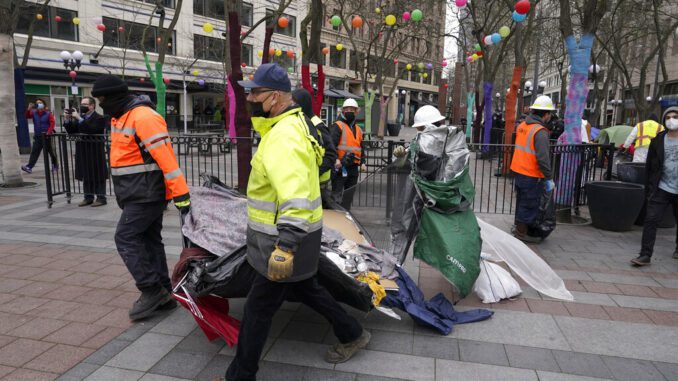
PORTLAND, Ore. — Makeshift shelters abut busy roadways, tent cities line sidewalks, tarps cover broken-down cars, and sleeping bags are tucked in storefront doorways. The reality of the homelessness crisis in Oregon’s largest city can’t be denied.
“I would be an idiot to sit here and tell you that things are better today than they were five years ago with regard to homelessness,” Portland Mayor Ted Wheeler said recently. “People in this city aren’t stupid. They can open their eyes.”
Increasingly in liberal cities across the country — where people living in tents in public spaces have long been tolerated — leaders are removing encampments and pushing other strict measures to address homelessness that would have been unheard of a few years ago.
In Seattle, new Mayor Bruce Harrell ran on a platform that called for action on encampments, focusing on highly visible tent cities in his first few months in office. The clearing marked the end of a two and a half week standoff between the mayor and activists who occupied the camp, working in shifts to keep homeless people from being moved.
In California, home to more than 160,000 homeless people, cities are reshaping how they address the crisis. The Los Angeles City Council used new laws to ban camping in 54 locations. LA Mayoral candidate Joe Buscaino has introduced plans for a ballot measure that would prohibit people from sleeping outdoors in public spaces if they have turned down offers of shelter.
Advocates for the homeless have denounced aggressive measures, saying the problem is being treated as a blight or a chance for cheap political gains, instead of a humanitarian crisis.
People who work with the homeless urge mayors to find long-term solutions — such as permanent housing and addressing root causes like addiction and affordability — instead of temporary ones they say will further traumatize and villainize a vulnerable population.
The pandemic has added complications, with homeless-related complaints skyrocketing in places like Portland, where the number of campsites removed each week plummeted from 50 to five after COVID-19 hit.
The situation has affected businesses and events, with employers routinely asking officials to do more. Some are looking to move, while others already have — notably Oregon’s largest annual golf tournament, the LPGA Tour’s Portland Classic, relocated from Portland due to safety concerns related to a nearby homeless encampment.
James Darwin “Dar” Crammond, director at the Oregon Water Science Center building downtown, told the City Council about his experience working in an area populated with encampments.
Crammond said four years ago the biggest security concerns were vandalism and occasional car break-ins. Now employees often are confronted by “unhinged” people and forced to sidestep discarded needles, he said.
“I don’t blame the campers. There are a few other options for housing. There’s a plague of meth and opiates and a world that offers them no hope and little assistance,” Crammond said. “In my view, where the blame squarely lies is with the City of Portland.”
